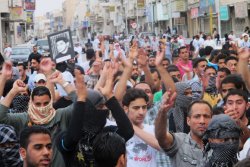 Saudi security forces came out in strength in Riyadh on a "day of rage" organised by pro-democracy campaigners who managed only small demonstrations in the eastern provinces.
Saudi security forces came out in strength in Riyadh on a "day of rage" organised by pro-democracy campaigners who managed only small demonstrations in the eastern provinces. Saudi security forces came out in strength in Riyadh on a "day of rage" organised by pro-democracy campaigners who managed only small demonstrations in the eastern provinces.
Saudi security forces came out in strength in Riyadh on a "day of rage" organised by pro-democracy campaigners who managed only small demonstrations in the eastern provinces.
Expectations that the unrest sweeping the Arab world in the last few weeks would spread to its most conservative kingdom appeared to have been dashed by pre-emptive security measures and stern official warnings against any protests.
Far larger demonstrations rocked Yemen, where tens of thousands of pro and anti-government protesters took to the streets as President Ali Abdullah Saleh struggled to maintain his grip.
Clashes broke out in the nearby island state of Bahrain, where Shia protesters were confronted by riot police guarding the royal court in Manama. Demonstrations were also held in Kuwait by stateless people demanding their rights.
The calm in the Saudi capital may have been achieved partly by an incident on Thursday in the eastern city of al-Qatif, where police shot and wounded at least two protesters. Unconfirmed reports described trouble there again.
Protesters rallied in Hofuf, close to the eastern Ghawar oil field and major refinery installations. The city has seen scattered protests by Shias who complain of discrimination by the Sunni majority.
Saudi sources also reported marches involving hundreds of people in al-Ahsa and Awwamiya near al-Qatif.
Security in Riyadh was high-profile and intense, with helicopters hovering overhead and police checks on cars and individuals heading for mosques, where protests were expected after prayers.
"Police cruisers were given orders to pull over any car," tweeted Mohammed al-Qahtani, president of the Saudi Civil and Political Rights Association. "I saw several cars being searched by officers, and they checked IDs."
Disappointed activists counted more policemen and journalists than demonstrators. "Where were all these policemen and helicopters when Jeddah was drowning?" asked one Saudi — a sardonic reference to the floods that devastated the Red Sea coastal city twice in the last two years and fuelled anger and resentment at government incompetence.
Last week Saudi Arabia banned public protests following demonstrations by Shia groups in the eastern areas during which 22 people were arrested and later freed.
Activists had used a Facebook page to call for protests but many reformist Saudis said they did not know who the organisers were and raised concerns of a possible provocation by the secret police in a country where demonstrations are rare.
Characteristically, the government mobilised religious leaders to speak out. "Islam strictly prohibits protests in the kingdom because the ruler here rules by God's will," Sheikh Abdel Aziz Alasheikh told worshippers in Riyadh's central mosque. Leading scholars had earlier issued a fatwa banning protests.
Rumours were rife in Riyadh, with anonymous text messages carrying dire warnings of huge fines, loss of nationality and expulsion from the country. "The messages are not coming from official channels, and are obviously scare tactics employed to discourage large numbers from showing up and adding to the tensions," one resident told the Guardian.
Last month King Abdullah, who is 87, sought to defuse opposition demands for change by unveiling an unprecedented package worth about $37bn (£23bn) to pay for unemployment benefits, education and housing subsidies the day after he returned from three months of medical treatment in the US and Morocco.
But critics said he was resorting to a familiar tactic of throwing money at a problem and not addressing its root causes — a lack of significant political reform.
Since then the streets of Riyadh have been festooned with flags and large green posters of a smiling King Abdullah welcoming him home.
"If you are well, we are all well," one read. "Welcome king of humanity," said another. Before a soccer match on Thursday, a message was circulated among fans urging them not to wear their team's colours but the green of the Saudi national flag.
For some Middle East analysts the extent of unrest in Saudi Arabia has been seen as a possible indicator of whether the popular unrest across the region will begin to ebb or continue to intensify. But a low turnout in protests may lead the king and his advisers to conclude that internal pressure for reform can be ignored.